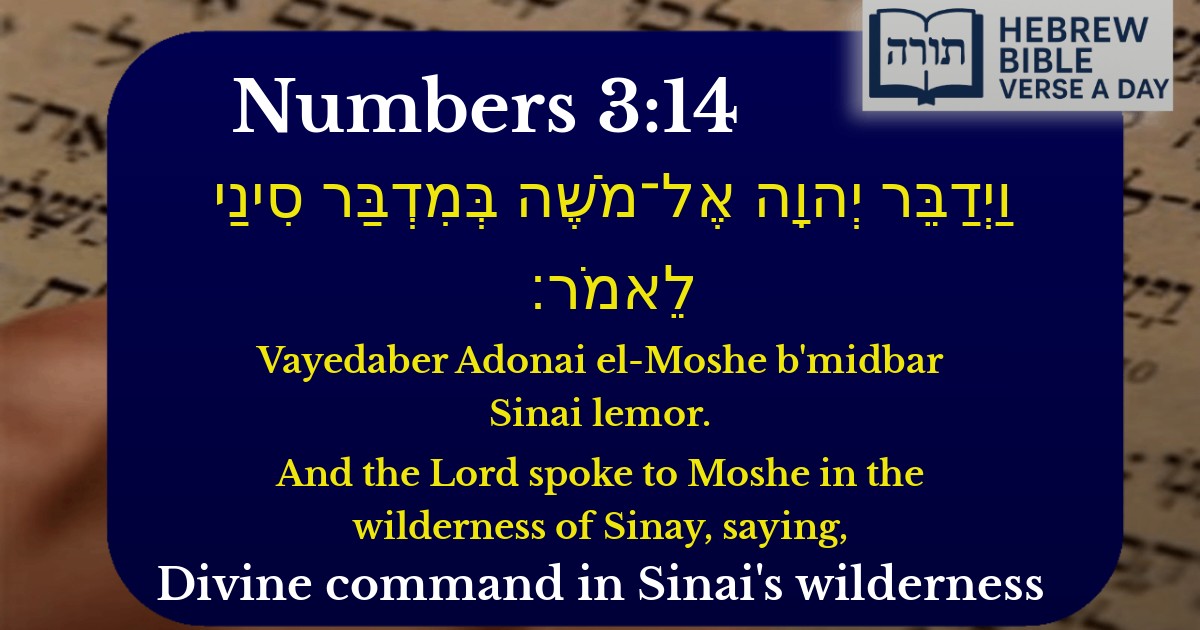Join Our Newsletter To Be Informed When New Videos Are Posted
Join the thousands of fellow Studends who rely on our videos to learn how to read the bible in Hebrew for free!
Hebrew Text
וַיְדַבֵּר יְהוָה אֶל־מֹשֶׁה בְּמִדְבַּר סִינַי לֵאמֹר׃
English Translation
And the Lord spoke to Moshe in the wilderness of Sinay, saying,
Transliteration
Vayedaber Adonai el-Moshe b'midbar Sinai lemor.
Hebrew Leining Text
וַיְדַבֵּ֤ר יְהֹוָה֙ אֶל־מֹשֶׁ֔ה בְּמִדְבַּ֥ר סִינַ֖י לֵאמֹֽר׃
וַיְדַבֵּ֤ר יְהֹוָה֙ אֶל־מֹשֶׁ֔ה בְּמִדְבַּ֥ר סִינַ֖י לֵאמֹֽר׃
🎵 Listen to leining
Parasha Commentary
📚 Talmud Citations
This verse is quoted in the Talmud.
📖 Yoma 4b
The verse is referenced in a discussion about the timing and location of divine communications to Moses.
📖 Megillah 31b
Cited in the context of discussing the appropriate readings for certain holidays, linking the wilderness setting to themes of revelation.
📖 Sanhedrin 56b
Mentioned in a broader discussion about the giving of the Torah and the significance of the wilderness as a place of divine encounter.


Location of Divine Revelation
The verse states that Hashem spoke to Moshe "in the wilderness of Sinai". Rashi (Bamidbar 1:1) explains that the Torah emphasizes this location to teach that the Torah was given in a desolate, ownerless place. This conveys that Torah is accessible to all who seek it, just as the wilderness is open to everyone. The Midrash Tanchuma (Bamidbar 1) expands on this idea, stating that had the Torah been given in Eretz Yisrael, the nations might claim exclusive rights to it. By giving it in the wilderness, it demonstrates that Torah belongs to all who accept it.
Significance of Sinai
The Rambam (Moreh Nevuchim 3:24) notes that Sinai was chosen as the site of revelation because its stark, humble environment symbolized the ideal state for receiving Torah—free from distractions and material concerns. The Talmud (Shabbat 89b) further explains that the name "Sinai" is derived from "sinah" (hatred), alluding to the fact that the nations' hatred of Israel stems from their acceptance of the Torah at this mountain.
The Wilderness as a Spiritual Preparation
The Sforno (Bamidbar 1:1) teaches that the wilderness was a place of testing and refinement for Bnei Yisrael. Just as the desert lacks physical comforts, the acceptance of Torah requires detachment from worldly excesses. The Ohr HaChaim (Bamidbar 1:1) adds that the wilderness represents humility, a prerequisite for Torah study, as one must empty oneself of arrogance to properly absorb divine wisdom.
Divine Communication with Moshe